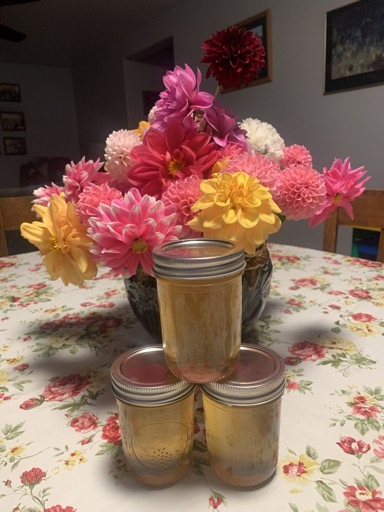Learning Patience
25/10/23 00:28

It was a gray, rainy day and I spent most of the day inside, as did the bees. When I checked on the colonies, there were just a couple of bees coming and going from the entrances. We do have good rain gear. We’ve lived in the Pacific Northwest for three years now. We walked down to the beach in the rain and looked out at the gray waters and cloudy skies. Then we came home and spent the rest of the day indoors.
One of the chores to which I have been attending is the extraction of honey from the honey combs I have harvested from the colonies. I started by filling half-pint jars that we will use as gifts and later filled a couple of pint jars. I took one pint to our son and his family, observing the tradition to taking the first honey of the harvest to the owners of the land where the colonies are located. I harvested another pint jar for our use. We had clam chowder and warm biscuits with honey for dinner.
The day before I though I had separated honey from wax and placed the wax in a container with the plan of taking it to the colonies for the bees to harvest the remaining wax. However, when I got up yesterday morning, it was apparent that I had not removed a sufficient quantity of honey from the wax. I placed the waxy material in a sieve and allowed it to drip. Over the course of the day, I extracted more than a pint from that wax. Extracted isn’t quite the right word. I allowed gravity to do its work and separate the honey from the wax.
In the big honey box where I have the frames hanging, I can hear the drip, drip, drip of honey falling into the chamber. Some of the wax makes its way through the grates, while some remains above. The wax that is in the honey chamber floats so I will be able to separate it with the technique of running the liquid through a sieve.
I thought I would complete the process in a day. What I am learning is that just allowing the honey to separate from the wax takes at least 24 hours. That is after it took my bees 48 hours to move out of the honey supers after I removed them from the colony and placed a one-way cover over them. The bees could get out, but they could not return. However there was a substantial number of bees who remained, steadfastly dedicated to their chores of tending the honeycomb. Next year, I need to pick warmer days to remove the honey from the colonies. And I need to allow more time. Yesterday’s rain forced me to go ahead and I ended up brushing quite a few bees out of the honey boxes near the entrance of the hive.
The bees are teaching me a great deal about timing and patience. I need to learn to pay even closer attention to them and how they go about their lives. And once the honeycomb is separated from the bees and uncapped, I need to learn to be patient with the honey extraction process. I though sure that I could extract all of the honey in a day. I expected to be cleaning equipment with all of the honey in jars by last evening. Now I know that I’ll be transferring honey to jars for at least the rest of this week.
Patience, Ted, patience. I thought that I might have learned a bit about patience by the time I entered my seventies, but it is clear that I still have a lot more to learn. And the bees are excellent teachers if I take time to observe and wait. After all, there is no rush. Hopefully we will have enough honey to last for months. We don’t need it all in the jars today.
I have long felt grateful for the non human neighbors that have graced my life. When we lived in South Dakota I learned to pay attention to the deer and turkeys. It took me a while to be able to recognize individual animals. I had to learn to look for the first fawns of the spring. They can hide very well when they are very close. The turkeys definitely had a pattern to their neighborhood wanderings. They would be at the same place at the same time of day for weeks. They kept their chicks hidden until they were pullets with significant amounts of feathers.
Our non-human neighbors have tended to be much quieter than our human ones. Of course we don’t live next to a field where the trumpeter swans come to rest each night. There are non-humans who can be incredibly loud.
The bees will go into a much quieter state for the winter. They’ll stay close to the hive and tend to the life of the colony, with births and deaths just as is the case in the summer. However, forage bees will not be traveling far from the colonies. They are relying on the honey they’ve stored from a summer’s work. I’m counting on them having stored enough to share. I will be paying close attention to make sure that I haven’t taken more than my share. I’ve still much to learn, and I need to be patient as I take time to observe and learn. It is a lesson they continue to teach me.
And, I’m also learning that gravity is a friend. I guess I knew it before, but I still had to learn a bit more.
